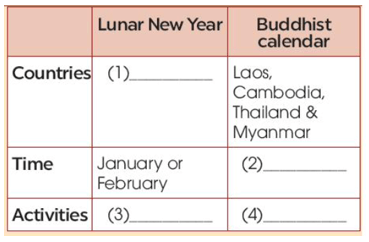Question
Tự luận
1 (trang 50 Tiếng Anh 11 Global Success): Read the text and complete the table below (Đọc văn bản và hoàn thành bảng dưới đây)
In ASEAN, besides welcoming the New Year on January 1, there are several cultures that. celebrate New Year's Day later in the year. For example, Viet Nam, Singapore, Indonesia and parts of Malaysia follow the lunar calendar so their New Year festivities often take place in January or February. Lunar New Year is a time for them to honour ancestors, get together with family and friends, have a big family meal, and wish one another prosperity for the year to come. The streets and houses are decorated, and fireworks are lit to scare away bad luck. There are also parades, street parties, and art performances in the new year celebrations.
People in Laos, Cambodia, Thailand, and Myanmar celebrate the arrival of the New Year according to the Buddhist calendar. Their New Year's celebrations are in April. People in these countries follow traditions such as offering rice to Buddhist monks to show their respect and receiving wishes for good luck and health from them. They decorate their homes, cook traditional dishes, and splash each other with water. There are also art performances, folk games, and dancing.
In these cultures, it is believed that water will wash away bad luck and ill health from the old year and allow people to start the new year fresh.
Hướng dẫn dịch:
Ở ASEAN, bên cạnh việc đón năm mới vào ngày 1 tháng Giêng, có một số nền văn hóa cũng vậy. mừng ngày đầu năm mới vào cuối năm. Ví dụ, Việt Nam, Singapore, Indonesia và một phần của Malaysia theo âm lịch nên lễ hội năm mới của họ thường diễn ra vào tháng Giêng hoặc tháng Hai. Tết Nguyên đán là thời gian để họ tỏ lòng thành kính với tổ tiên, sum họp với gia đình và bạn bè, dùng bữa cơm gia đình thịnh soạn và chúc nhau làm ăn phát đạt trong năm tới. Đường phố và nhà cửa được trang trí, và pháo hoa được đốt để xua đuổi những điều xui xẻo. Ngoài ra còn có các cuộc diễu hành, tiệc đường phố và biểu diễn nghệ thuật trong lễ kỷ niệm năm mới.
Người dân Lào, Campuchia, Thái Lan và Myanmar chào mừng năm mới theo Phật lịch. Lễ kỷ niệm năm mới của họ là vào tháng Tư. Người dân ở những quốc gia này tuân theo các truyền thống như dâng cơm cho các nhà sư Phật giáo để bày tỏ lòng kính trọng và nhận được những lời chúc may mắn và sức khỏe từ họ. Họ trang trí nhà cửa, nấu các món ăn truyền thống và té nước vào nhau. Ngoài ra còn có các tiết mục văn nghệ, trò chơi dân gian, dân vũ.
Ở những nền văn hóa này, người ta tin rằng nước sẽ gột rửa những điều xui xẻo và bệnh tật của năm cũ và cho phép mọi người bắt đầu một năm mới tươi mới.
Bài làm:
Read more: Tiếng Anh lớp 11 Unit 4 Communication and Culture (trang 49, 50) - Global Success
Verified Answer
|
|
Lunar New Year |
Solar New Year (Buddhist calendar) |
|
Location |
Brunei, Indonesia, Malaysia, the Philippines, and Singapore |
Laos, Cambodia, Thailand and Myanmar |
|
Time |
January- February |
April |
|
Activities |
honour ancestors, get together with family and friends, have a big family meal and wish one another prosperity for the year to come; the parades, street parties and art performances |
offer rice to Buddhist monks to show respect and receive wishes for good luck and health, decorate homes, cook traditional dishes, and splash each other with water; art performances, folk games and dancing |
Hướng dẫn dịch:
|
|
Tết Nguyên Đán |
Tết Dương lịch (Phật lịch) |
|
Địa điểm |
Brunei, Indonesia, Malaysia, Philippines và Singapore |
Lào, Campuchia, Thái Lan và Myanmar |
|
Thời gian |
Tháng một - tháng hai |
Tháng tư |
|
Hoạt động |
cúng tổ tiên, sum họp gia đình, bè bạn, ăn cơm sum vầy, chúc nhau làm ăn phát đạt; các cuộc diễu hành, tiệc đường phố và biểu diễn nghệ thuật |
cúng cơm cho các nhà sư để tỏ lòng thành kính và cầu chúc sức khỏe, trang hoàng nhà cửa, nấu các món ăn truyền thống, té nước cho nhau; văn nghệ, trò chơi dân gian và dân vũ |

